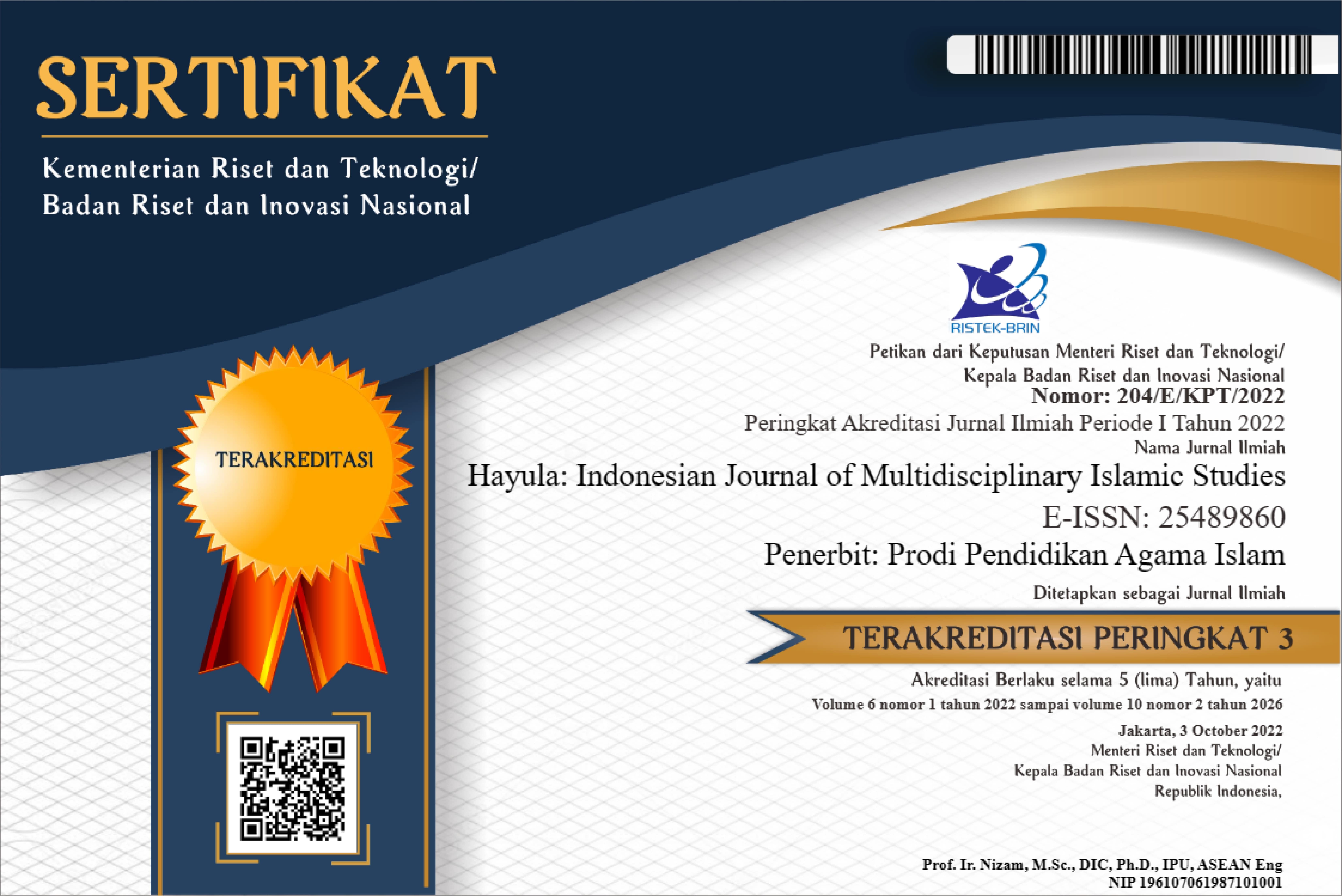Interaksi antara Ayah dan Anak pada Konsep Ibn dalam Alquran dan Implikasinya terhadap Pembelajaran PAI di Sekolah
DOI:
https://doi.org/10.21009/hayula.001.2.02Keywords:
The Concept of Ibn, Alquran, AffectionAbstract
In this research analyzed some verses pertaining to the word bunayya, which is defined as an addressing term for a child that is full of affection. In Islam, educating a child is very important; therefore, parents are obligated to educate and direct their children to the right path. The research adopted descriptive method with qualitative approach. The technique use for data collection was literature study. In this research, the researcher is the main instrument. Based on the findings, it can be inferred that affection is the primary foundation in education. As the education given is laid on the basis of affection, no matter how hard the commands, prohibitions, and even reprimands are, a child will more easily accept them because they are given by the father with full of affection. Subsequently, the implication of the findings for the teaching and learning of Islamic education in schools is that in the inculcation of the values of affection, an educator should educate and teach knowledge to his or her students with full of affection.
References
Al-Ghazali, I. (2014). Ayyuhal Walad . Banjarbaru: Darussalam Yasin.
Al-Ghazali, I. (2014). Ihya Ulumuddin. Bandung: Marja.
Al-Jaza>iri, A. B. (2016). Minhajul Muslim (Konsep Hidup Ideal Dalam Islam). Jakarta: Darul Haq.
Al-Maraghi, A. M. (1992). Tafsir Al-Maraghi. Semarang: Toha Putra.
Fathoni, A. (2006). Penelitian Tekhnik Penyusunan Skripsi. Jakarta: PT Asdi Mahasatya.
Fitri, A. Z. (2013). Manajemen Kurikulum Pendidikan Islam. Bandung: CV Alfabeta.
Hamim, K. (2013). Konsep Pendidikan Anak Dalam Al-Qur`an Surat Lukman. Jurnal Penelitian Keislaman Vol. 9, No. 1, 120.
Harmaini. (2013). Keberadaan Orang Tua Bersama Anak. Jurnal Psikologi, Vol. 9, No. 2, 97.
Ichsan. (2004). Orientasi Nilai Pendidikan Agama Islam di Sekolah. Jurnal Pendidikan Agama Islam, No. 1, Vol. 1, 60.
Kuswoyo, P. (2012). Ketuntasan Belajar Siswa Pada Mata Pelajaran PAI Melalui Metode Kisah. Jurnal Pendidikan Islam, 75.
Mujahid. (2005). Konsep Fitrah Dalam Islam dan Implikasinya Terhadap Pendidikan Islam. Jurnal Pendidikan Agama Islam, Vol. 2, No. 1, 39.
Rahman, A. (2012). Pendidikan Agama Islam dan Pendidikan Islam. Jurnal Eksis 8 (1), 205.
Sadulloh, U. (2010). Pedagogik (Ilmu Mendidik). Bandung: Alvabeta.
Shihab, M. Q. (2008). Tafsir Al-Misbah. Jakarta: Lentera Hati.
Shihab, M. Q. (2010). Tafsir Al-Misbah. Jakarta: Lentera Hati.
Syahidin. (2009). Menelusuri Metode Pendidikan Dalam Al-Qur`an. Bandung: Alfabeta.
Downloads
Published
How to Cite
Issue
Section
License
Authors who publish with this Journal agree to the following terms:
- Author retain copyright and grant the journal right of first publication with the work simultaneously licensed under a creative commons attribution licensethat allow others to share the work within an acknowledgement of the work’s authorship and initial publication of this journal.
- Authors are able to enter into separate, additional contractual arrangementfor the non-exclusive distribution of the journal’s published version of the work (e.g. acknowledgement of its initial publication in this journal).
- Authors are permitted and encouraged to post their work online(e.g. in institutional repositories or on their websites) prior to and during the submission process, as it can lead to productive exchanges, as well as earlier and greater citation of published works.
Users/public use of this website will be licensed to CC BY







